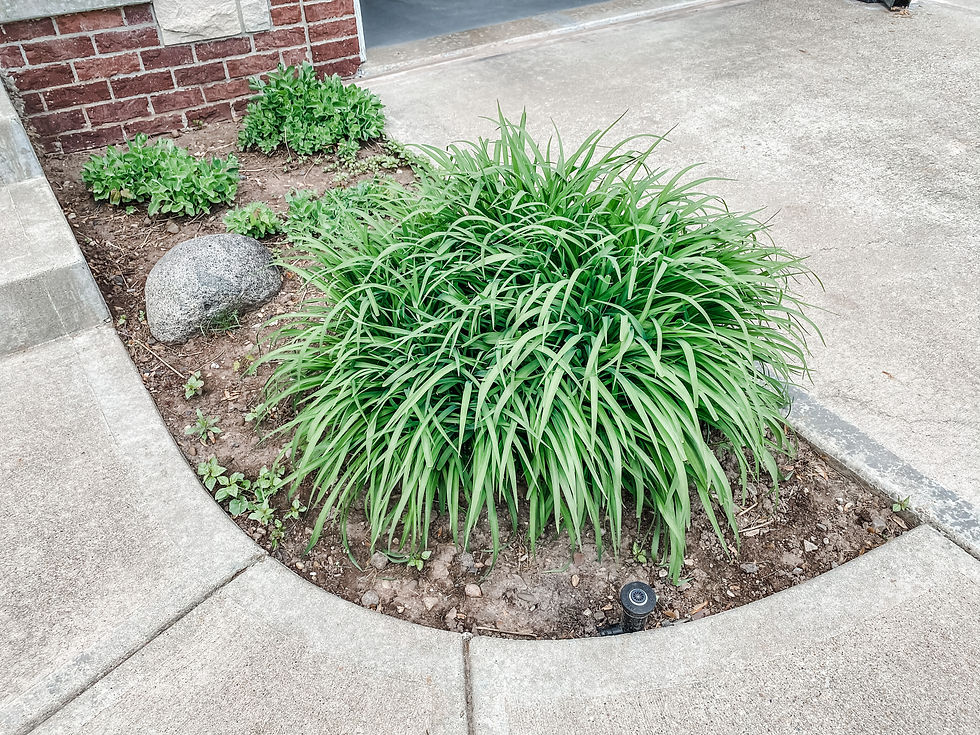How to Divide Perennials - Splitting Large Daylilies and Sedum Plants into Smaller Transplants
- Zach

- May 19, 2021
- 3 min read
When we moved in, the front plant beds had several boxwoods that had overgrown or had died (if you didn't catch it, be sure to watch when I tried to pull them out with my SUV unsuccessfully on this post). I got rid of the boxwoods but I left a few daylilies and sedum plants in the dirt thinking I could transplant them later. As they’ve started to come this spring, I can tell they are going to be huge so I’m going to split them up into smaller plants. I don’t have a plan yet for where I want them to be in the long run so I’m going to plant them in the backyard and I will transplant them again later once I decide what to do in the front..

Why Split and Divide Plants?
Lots of perennial plants can be divided or split to start smaller plants. You might have a plant that has overgrown its space or is cramping and crowding others. Instead of getting rid of it, you can simply divide it into multiple smaller plants. This is something you will want to do now during spring before these plants start blooming - plus, there’s a greater chance for more free rain.
Speaking of savings, splitting can save you a lot of money. I saw a daylily plant about the size I’m going to split my plant into for $14 at the store. I got ELEVEN small daylilies out of one huge plant - that’s a $154 value of this DIY project! I also got about 12 small sedum plants out of three big original plants. Extra bonus!

How to Split and Divide Daylilies
Daylilies are very common in our area and most houses or businesses have some version of these. You can really beat these things up and you probably won’t hurt them. They are great for planting around tree roots and just filling space in the garden. This daylily is probably about 20 years old.
Step 1 – Dig around the plant with a shovel. Step on the shovel with your foot making a circle around the daylily. Try to dig wide enough so that you get all the roots.

Step 2 – Pull out the entire daylily by getting under the plant with your shovel and popping it up.

Step 3 – Once you have it out you simply treat it like a fruit or vegetable and saw away pieces with a garden knife. One of my favorite garden tools is the garden knife. You can use it for digging, mixing, and cutting. You will want to saw right down the middle of both the green plant and root, and continue cutting the plant to your desired size.


Step 4 – Continue sawing and splitting the day lilies into smaller plant sections.

Step 5 – Pick a spot and plant the new individual daylilies.Water in and add Plant Start to prevent shock. You mix Plant Start with water and it gives the needed nutrients to survive. I use this with every tree and every plant whenever I first plant or transplant them.

Step 6 – Share the extra splits with your friends! Or don't, and plant them all around your yard!

How to Split and Divide Sedum
Sedum is one of my favorite perennials. They come in a variety of colors and sizes. Once established, they do great pretty much anywhere in the yard. In the fall they turn a real pretty red, and add a great fall color to your garden. You can leave them up in the winter for the birds to eat and for winter interest.

The process is almost exactly the same as the daylily, except unlike daylilies, sedum will naturally break apart and split when you start to dig them up.

Use your hand to gently lift up the split individual sedum and transplant to where you want it.

Get Digging
Don’t be afraid to try dividing and transplanting your large daylilies and sedum! Hank helped me and was able to split the daylilies and gently move the sedum, and he’s seven. If he can do it, you can do it!

Need a lawn fix? Here's what we used:
Garden Shovel (affiliate)
Fiskars Multipurpose Garden Knife (affiliate)
5-gallon bucket for mixing Plant Start and Water (affiliate)
DISCLAIMER: This post contains affiliate links, which means that if you click on one of the product links, we may receive a small commission at no extra cost to you. Thank you for your support!







Comments